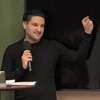hypen
The refinement paradox and cumulative cultural evolution: Complex products of collective improvement favor conformist outcomes, blind copying, and hyper-credulity
PLOS Computational Biology Abstract Social learning is common in nature, yet cumulative culture (where knowledge and technology increase in complexity and diversity over time) appears restricted to huma

Karim Jebari: The social impact of AI - Inspirations on what to explore and how to aviod the hype
Karim Jebari, PhD in Philosophy and researcher at the Institute for Futures Studies talks about some tools for finding interesting things to study in the field of the social impact of artificial intelligence. And also, advice on how to avoid some of the hype surrounding AI. From the workshop “Why we need research on AI impact now”, that was held at the Institute for Futures Studies on January 21st 2020.

Hur arbetstagare kan skapa arbetsplatssegregering. Intervju med Moa Bursell och Fredrik Jansson
När man pratar om segregering av arbetsplatser riktas ljuset lätt mot arbetsgivaren och kanske framför på det sätt en verksamhet rekryterar sina anställda. Men så länge det finns rörlighet på arbetsma
Frukostseminarium: Kan man planera för framtiden?
De senaste decennierna har flera politiskt tillsatta framtidskommissioner och utredningar sett dagens ljus för att snart falla i glömska eller drunkna i allt som redan händer här och nu. Men vilka behoVi har bjudit in Katarina Engberg, fil. dr. i Freds- och konfliktforskning samt tidigare departementsråd i Regeringskansliet, att berätta om sin erfarenhet av strategisk planering i Statsrådsberedningen (Kansliet för strategi- och framtidsfrågor och EU-kansliet), Försvarsdepartementet och Försvarsmakten. Tid: Torsdag, 15 februari 08.30–10.00 med enklare frukost från kl. 08.00Plats: Institutet för Framtidsstudier, Holländargatan 13 i Stockholm

Niels Selling
I am a researcher at the Institute for Futures Studies, an adjunct associate professor at Linköping University, and an adjunct professor at IESEG School of Management. I am a mixed-methods researcher w
Kriminella på kartan - en ESO-rapport om den organiserade brottslighetens geografi
2023:3. Expertgruppen för Studier i Offentlig ekonomi. Abstract Trots nästan dagliga nyhetsrapporteringar som pekar på motsatsen har det totala våldet per capita i Sverige inte ökat sedan början av 2000

Anna Näslund
I am professor of Art History at Stockholm University and researcher at the Institute for Futures Studies. My research focuses on visual culture, picture theory and digitization. The project Selling Pic traces the genealogy of contemporary AI-generated image hype over 200 years of promoting technologies for the production, reproduction, and circulation of pictures on a mass scale. It aims to understand the historical role of pictures not merely as commodities but as agents of commerce. The project focuses on emerging picture techniques in the 1820s, 1920s, and 2020s, examining iconographic and discursive patterns in pictures of mass reproduction (metapictures) and comparing vernacular picture theories—expressed in advertising copy and trade journalism—with canonical picture theories. Rooted in historical material practices, the project seeks to clarify and expand our understanding of how and why pictures play a central role in the work of selling in modern and contemporary societies.

Selling pictures. Pictorial Economy and Commoditization 1820–2020
This project will place the current discussions concerning AI-generated images in a historical context, comparing it to two previous technological breakthroughs that have affected the use of pictures for commercial purposes.

Nina Lager Vestberg
I’m a professor of visual culture in the Department of Art and Media Studies at NTNU (Norwegian University of Science and Technology) in Trondheim, where I coordinate the Media, Data, Museumsresearch g
Who is Deciding the Future Role of AI in Healthcare in the Nordics?: A Research Brief
Working paper. Malmö University Summary Over the last few years there has been a considerable amount of hype around the potential role of AI in healthcare. This has greatly increased since the COVID-19








